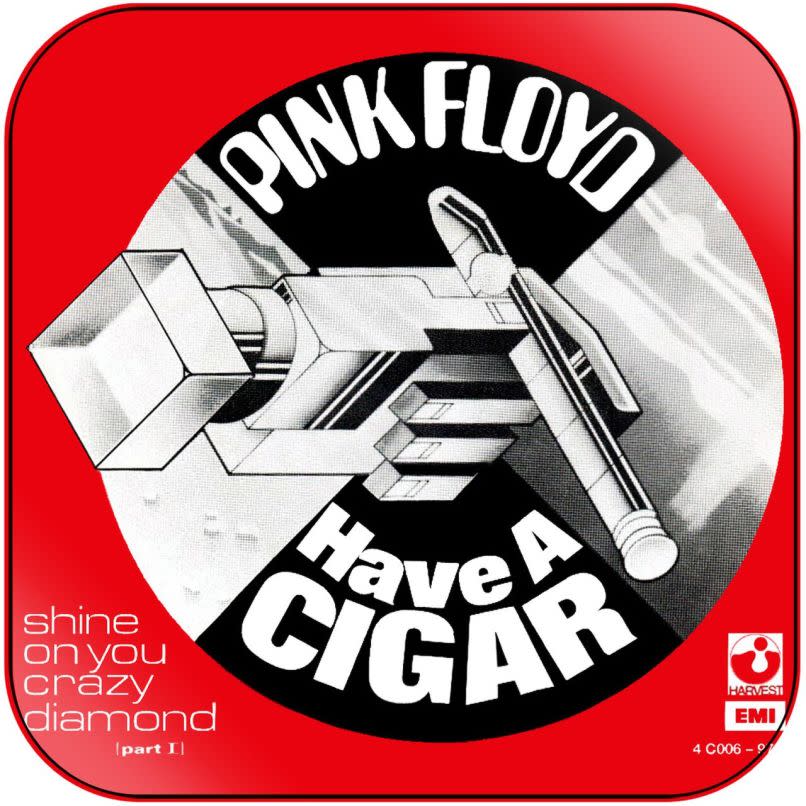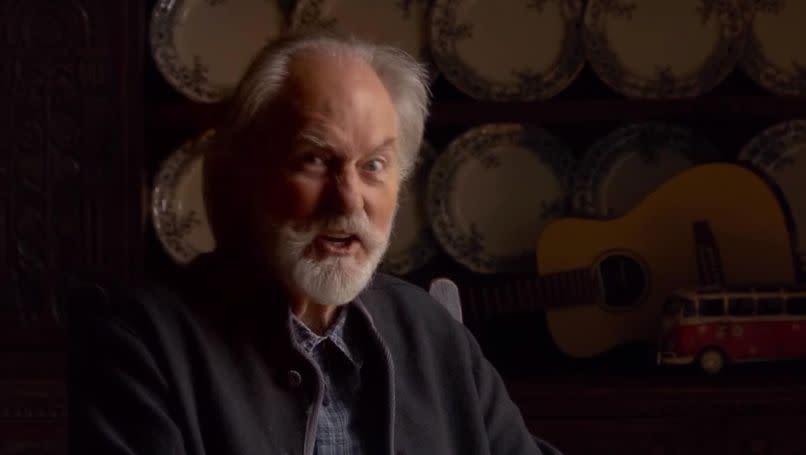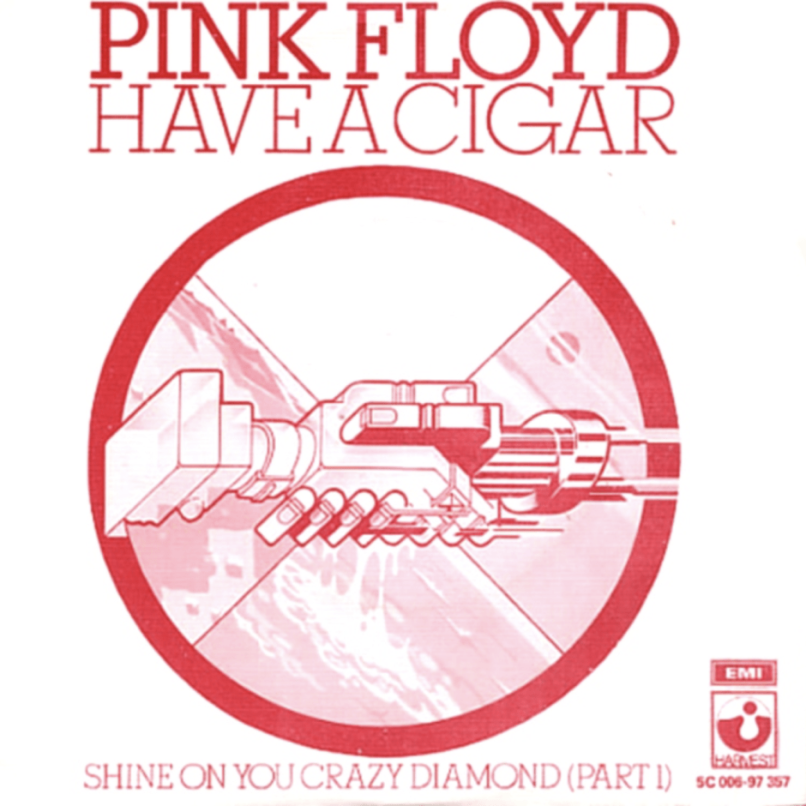The Story Behind Pink Floyd’s “Have a Cigar”
The post The Story Behind Pink Floyd’s “Have a Cigar” appeared first on Consequence of Sound.
Pink Floyd’s “Have a Cigar” is a scathing critique of the music industry.
The third track off of 1975’s Wish You Were Here is sung from the perspective of a record company executive, who cynically implores the band to “ride the gravy train” by following the proven formula of their prior blockbuster, 1973’s Dark Side of the Moon. “Which one’s Pink?” the song asks. It’s a standout line that resonates in this particular recording all the more because neither David Gilmour nor Roger Waters sings it. In fact, no one in the band sings it. Roy Harper does.
Who is Roy Harper? He’s an English artist raised on Romantic poets like Shelley and Keats and later inspired by the performances of Bob Dylan and Paul Simon. He’s a revered figure among singer-songwriters and musicians across the world — so much so that none other than Led Zeppelin titled the closing track of their third eponymous album “Hats Off to (Roy) Harper”.
Editors' Picks
Pink Floyd Facetime Dune Pink Floyd Hans Zimmer Eclipse cover arrangement trailer watch stream Hans Zimmer Covered Pink Floyd’s “Eclipse” with a 32-Person Choir Over FaceTime
So, how did Roy Harper wind up on “Have a Cigar”? I decided to get the story straight from the source by speaking to the legend himself this past July. In his 80th year, I found Harper to be extremely personable, sharp, and witty. Together, we connected the dots between the Pink Floyd hit and his own beloved song, “When an Old Cricketer Leaves the Crease” — a track that he recorded at precisely the same time and in precisely the same place: London’s Abbey Road Studios.
Read below and learn the story behind the song.
You are best known for being a folksinger, but “Have a Cigar” is anything but folk and acoustic like “Cricketer”. It’s about as fundamentally different in voice and tone as one can imagine. So, it isn’t obvious to me that you would become the voice for this classic Pink Floyd recording. How did that happen?
It’s actually been a while since I’ve heard the song. I should have actually listened to it last night to familiarize myself with it again [he laughs]. I was recording my album, [HQ], in Studio 2 at Abbey Road. They were in Studio 3. They were having trouble with this song, and I was in and out of the studio. We were all friends. It was obvious they couldn’t sing this song, because they were both vocally wrecked. They were talking about abandoning it, throwing it away, or coming back another day.
But they couldn’t quite admit yet that they were going to have to abandon it. And I said from the back of the room, and it was straight from brain to tongue really, and I don’t operate in any other way … I said, “I’ll do it, for a price.” And Roger [Waters] said, “What’s the price?” [impersonating Waters and laughs]. And I said, “A season ticket to the Lords for life.” [Lords is a cricket field where the Middlesex team plays.]
So, when Roger Waters asked you the price and you responded “season tickets to Lords for life,” were you saying that tongue and cheek?
Yes, there was a bit of cheek there. But it wasn’t going to cost very much. At that stage, it was going to cost about 50 quid or 100 quid a year. At that stage of my life, I wasn’t going to live for another 20 years anyway. So, the total cost of it to him [Waters and the band] would have been a couple thousand I think.

Pink Floyd
You were being both cheeky and literal then?
Yes, I was actually undervaluing myself. I could have gone for 1000 quid or 2000 quid, but that would have been crass. That’s a move of someone who’s crass. I wanted a badge or something that I could wear for the rest of my life. A figurative badge on my lapel or my left breast, like being awarded a metaphorical medal or something. A memento. Another figurative badge on my career. But one that I could use whenever there was a game on.
So, even then, you knew that it was going to be a lasting “moment” in your career?
I didn’t quite see that particular thing. All I thought was what’s a fair exchange, and I can’t be crass. I’m not going to be crass. Those were the two things I thought. Because he was offering … he could have said, “No, that’s too expensive, go away.” But he didn’t, and we all shook on it, and that was it.
Once you struck your deal with the band, where did the direction come in terms of how to sing the song? Did it just come from within?
Well, obviously it was based on what they had done already. I couldn’t do it there and then. I had to go and listen to the song at home for a night. I came back the following day and didn’t quite nail it, because I just wasn’t quite ready. But then on following day — two days later — I did nail it. And they had a song. So that was it.
But was your singing on that song your own interpretation, or was there some kind of direction or advice given?
No, they weren’t going to advise me. I altered the lyrics into my own language. And those are the lyrics that still exist on the record. I noticed that they haven’t changed, because my spellings are on there [the album sleeve].
My favorite part of the recording is where you sing the lyric “Everyone is just green” and your voice breaks. Was that intentional? What was your thinking there?
I absolutely wanted to sing “green” in the way I did. It’s a key word in the song. Greenhorns are there to be ripped off by unscrupulous apes. That’s a right and an initiation. Lessons have to be learned, otherwise it keeps occurring. Once that inflection had occurred, it was easy to repeat it. The sheer force in the vocal encouraged me to do it, and I kept it in there.
Sounds like you nailed it on the second take…
Yes, it was on the second take. There wasn’t going to be a third take.
Did you know you nailed it?
Yes. I knew I’d done it. And [recording engineer] Brian Humphries knew, too. Dave [Gilmour] was pleased. There was general acceptance in the control room that it was a done deal.
I’m surprised the band would have an outsider sing one of their songs. It had only been done once before — on “The Great Gig in the Sky”.
Well, it was either that or throw it away. You know, a lot of these things in the grand scale of a lifetime, they’re just moments. Little bits of truth and falsehood open themselves up to you and are confirmed or not. But I’d like to be positive because it was a very positive moment in truth. Even with all the connotations, artist versus manager and all the rest of that, it was a positive moment. Everybody enjoyed it. And we should continue to enjoy it.
Does it surprise you that the “Cigar” track is as pivotal as it is?
No, it doesn’t. I have my own private thoughts about what could have been done with me by a producer who wanted to discover that in me perhaps. But that’s fairytale, and I don’t want to go into fairytale. I mean, yes, I could have been the singer for Pink Floyd, but it wasn’t like that. I was on a journey that was spectacularly my own. I had lots of opportunities to do things with people like David Bowie, Mick Ronson, Jimmy Page, all kinds of people. Even Dave Gilmour. But always — always — the feeling I have is that I’ve got to carry my own thing down the road and not betray it in any way. And not dilute it and try my best to keep up with myself.
At the same time in 1975, you recorded a deeply personal song called “When an Old Cricketer Leaves the Crease”. “Have a Cigar” is deeply impersonal and about the music industry from the perspective of a crass label executive. You were known for being a poet and folksinger. Did it surprise people that you were the voice behind “Have a Cigar”?
I just think that most people didn’t know about it. And it was in very small print on the record, so nobody really saw it. Not to begin with. It was a slow burner. It only became obvious in the last decade that this is the case. Too late for my own good, but I’m not bothered by that at all. You know, it’s a bit of a millstone in the same way that [Led Zeppelin’s] “Hats off to (Roy) Harper” is a bit of a millstone as well.
You know, they’re perhaps the things that I’m now best known for, and I have to carry them. You can look at my songs like a mountain range with these two distant giants in the background. And whereas the mountain range of my own catalog has other peaks like “Cricketer”, they’re different sorts of terrain than Floyd or Zeppelin. But those two things were a false terrain for me. The Zeppelin thing was done lovingly, and I know that. And I’m humbled by that, and it’s great that it exists.
And to some extent because of that, I’m known to a lot of Zeppelin fans. So, that’s expanded my career a bit. But it doesn’t stop those kinds of things becoming a millstone that’s actually bigger than you are. In one breath, I can really appreciate what they are. And in the next breath, I have to turn my back on them completely.
Were you looking for different mountain ranges, so although Cigar flowed naturally from you, it didn’t represent the mountain range you were looking for?
If we were sensible, for lack of a better word at the moment, I would have done the best I could have done, come hell or high water, to preserve the Trigger band [Harper’s backing band on his album HQ]. To preserve the band with Chris Spedding and Bill Bruford in it because that was my route to a “Have a Cigar” type of rock band. But I fell at the final fence in that horse race, and it was an intentional fall. I just lazily came off the horse.
The thing is, did I want that? Did I really want that? Could I do it? What sense would it make? It made various amounts of sense to do that. But I still wanted to be the solo man, in the solo place, making a solo statement. And I really honestly and truly couldn’t have a band doing that with me. I couldn’t do that. I needed to be humble, and I couldn’t humiliate others in any potential band.
I didn’t want servants. I didn’t want people to help me or to stand on or to stand on the shoulders of to accomplish the journey. I had to do it alone. You probably have to grow up with a band, build trust in each other’s opinions. We were all mature people at that stage, and I was 34.

Roy Harper
You had these moments – a direction you could take as a solo artist making a solo statement.
For the simple reason that no one else could make Roy’s statement other than Roy. It’s possibly inconsiderate to have other people on a stage with you who are not entirely in agreement with what you’re saying. It’s inappropriate, because some of the things you are going to say are not going to suit everyone in the band. In some ways, this limits you. It limits my voice being in a band.
All of the songs I had in me to write from that point onward would have been changed by joining a group of people. I personally find that a group expresses itself as a group, and you have to become a member of the group unless you want to start out as being the acknowledged or even dictatorial, totalitarian leader.
If you want to do that, fair enough, but I’m not like that. Some of the things I tend to write about would not be average opinion, and I don’t know that it would be proper to have a band identify with left-field prose coming from the songwriter, on stage, live. A band is a responsibility that you have to be in each other’s minds for. A band is a democracy, until it’s not.
We all have to generally agree about what’s being sung, tacitly at least. Write songs together. You must take notice of the fact that a band is a shared responsibility, and it’s not one that I was really that keen on having. Being solo separates me from that responsibility in a very definitive way. The responsibility of having other members, that is.

Pink Floyd
As you look back at “Have a Cigar”, how do you feel about that recording?
Completely vindicated.
What do you mean by that?
Well, I could do the job and I did it — against what were considerable odds or might have been thought to be considerable odds. The thing is, the way I feel about it is that it’s a good leader on that album, and it was the single. It was a double-sided single. The single was “Shine on You Crazy Diamond” and “Cigar”, I believe. Double A-side. But no one knew during the hundreds of thousands of times it was played on the radio, nobody knew that [it was me singing]. Nobody knew who sang that, which I thought was slightly unfair. But that was always going to be in the gift of the band and the management.
Who do you believe most people think is the voice in that song?
I’ve never thought about that. Seriously, I’ve never thought about it. That’s not something I should be concerned about.
Did that feel unsatisfying to you that most people didn’t know it was you?
No. I was a hired hand. The thing is that I was also a friend. And I had to get on with my own life. My own life was more important than any other consideration, really. I never thought that.
It’s a fascinating piece of rock and roll lore that most fans just assume is the band singing, especially since you are best known for your very different catalog of wonderfully poetic, acoustic songs that are so vastly different?
Yes, it is. But, [saying to himself] you’ve lived in rock and roll. You’ve lived on the outskirts of rock and roll, and you’ve toured with these guys. So, you know what goes on. You know the whole sketch behind it. So it’s very easy to play the part. You know, I’m an actor and I usually write my own scripts, but this one I could do without even thinking about it because I knew it. I didn’t suddenly have to become Richard III [he says with a hearty laugh].
Read ahead to hear about Harper’s stories behind “When an Old Cricketer Leaves the Crease”…
The Story Behind Pink Floyd’s “Have a Cigar”
Peter Csathy
Popular Posts
Rick Moranis Hospitalized Following Unprovoked Attack in Manhattan
Mick Fleetwood Joins TikTok Just to Recreate Viral "Dreams" Video: Watch
Jim Carrey Makes His Saturday Night Live Debut as Joe Biden: Watch
Sacha Baron Cohen Trolls Mike Pence in Trailer for Borat 2: Watch
10-Year-Old Music Prodigy Nandi Bushell Wrote Dave Grohl a Theme Song: Watch



